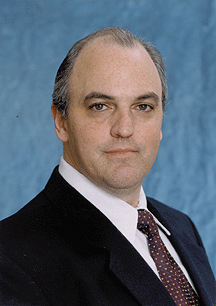Actively Trading Options
George Fontanills Of Optionetics
by Jayanthi Gopalakrishnan
You might assume that graduates of Harvard Business School know everything they need to know, but George Fontanills, cofounder of Optionetics, is an active trader and Harvard grad who learned quickly that he had a lot more to learn.Disbanding his real estate business in the 1980s, George Fontanills made a decision: his new business would be trading. After years of study and practice, he developed a new method of making money: delta-neutral options trading. He called his technique optionetics, and now Optionetics is a leading education and publishing firm dedicated to teaching investors how to trade options effectively. What can George Fontanills tell us about successful options trading? STOCKS & COMMODITIES Editor Jayanthi Gopalakrishnan spoke with Fontanills on June 2, 2004.

What we teach people, first and foremost, is the knowledge of the markets and the instruments you're going to trade.
Would you start by telling us about how you got interested in trading?
When I got started, I had no idea what trading really was. After I graduated from Harvard Business School I basically started my own business, in real estate. That was in the 1980s. But if you look at the 1980s, you'll see that in about 1986-88, interest rates just got way too high, and being in real estate was not a good idea anymore. Someone in my office traded for himself, and he said: "Hey, I've got a great idea. Instead of doing this real estate stuff, why don't we do some trading?" I didn't really know what that meant, but he explained it to me, saying, "You buy if you think it's going up, and you sell if you think it's going down," and I thought I could figure that out. Obviously, it was a little tougher than I thought it would be.
So when you started, were you doing short-term trading?
Yes, primarily short-term trading, trading index options and some commodities.
And you began with options?
With index options, then commodities. I didn't know what an option was, just like a lot of people who start from scratch. I didn't read any books, but I relied on this individual who worked for me to tell me what to do. It didn't turn out very well after 30 days, so I decided I had to learn how to do it myself. I think that's how a lot of people learn!
Did you just read a lot, and then paper trade?
Yes, exactly. I started reading any book I could find on trading, and I started writing computer programs using TradeStation. I invested in the best computers I could find and the best technology I could find, and I figured that was how I was going to get an edge over everybody else. And I just tried to absorb as much as I could. I realized I wasn't as smart as I thought. Harvard doesn't teach you how to do this stuff, you know. But it does teach you to understand what you don't understand. I knew I had a long way to go.
And you've been at it ever since then?
Absolutely. And I'll be at it for the rest of my life.
What would you say are the major characteristics of a successful trader?
What we teach people, first and foremost, is the knowledge of the markets and the instruments you're going to trade. You don't have to be an expert at everything. I find that the very best traders are specialists in a certain type of asset, whether it's stocks or commodities, and they know their markets well. As far as knowing the strategies to use in specific markets at different times, and as far as knowing risk management goes, being able to manage your risk is difficult for a lot of people.
...Continued in the August 2004 issue of Technical Analysis of STOCKS & COMMODITIES
Excerpted from an article originally published in the August 2004 issue of Technical Analysis of STOCKS & COMMODITIES magazine. All rights reserved. © Copyright 2004, Technical Analysis, Inc.
Return to August 2004 Contents